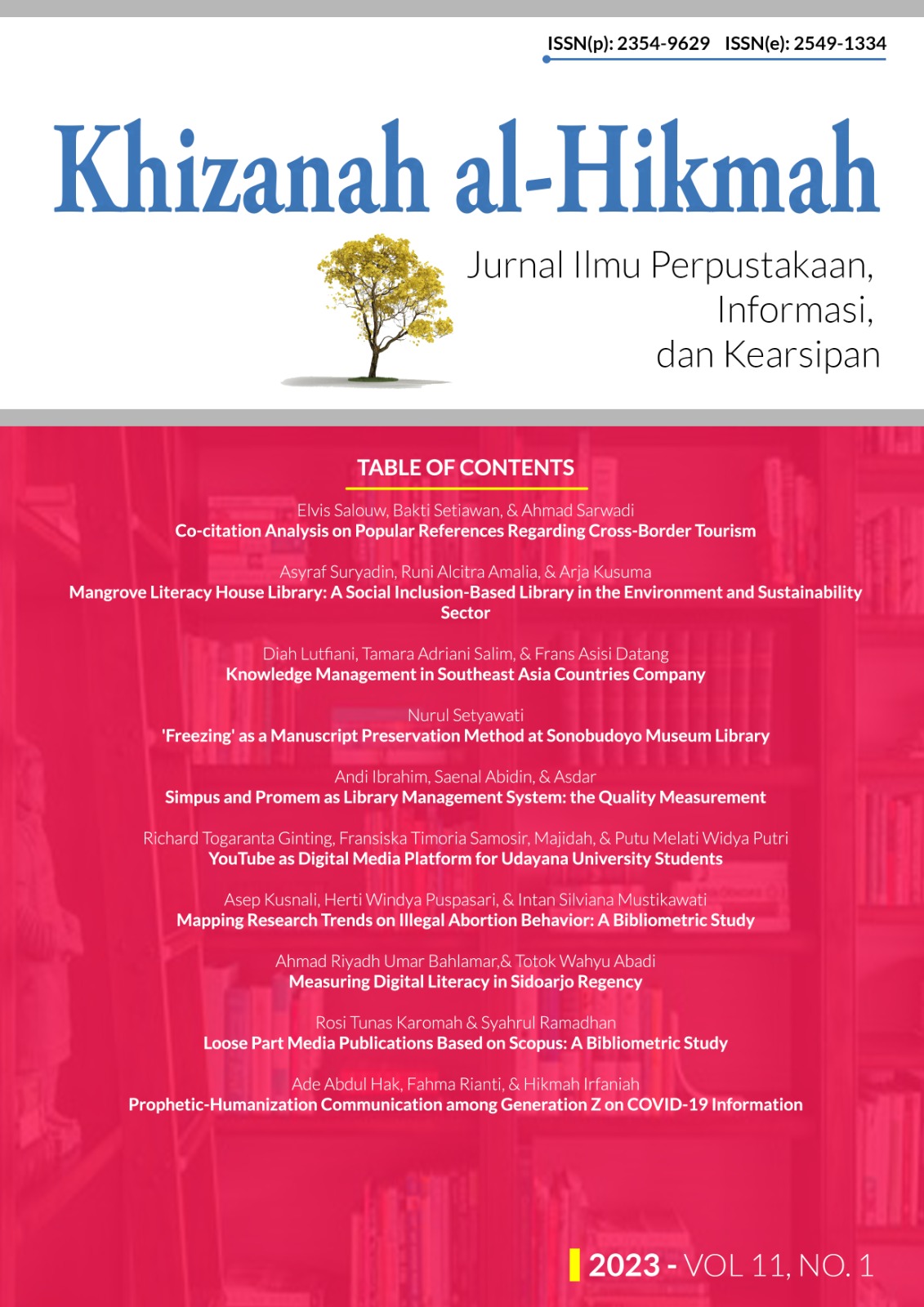Prophetic-Humanization Communication among Generation Z on COVID-19 Information
Abstract
For Generation Z, especially those who study librarianship in the digital age, e-literacy is essential. It refers to using a computer with information, media, moral literacy, and learning and thinking abilities. One of them is how they communicate COVID-19 information. Through the behavior of librarianship students from the seven State Islamic Universities in Indonesia, this study aims to measure the impact of e-literacy on prophetic-humanization communication among Generation Z. With a 9% error rate and a sample size of 116 pupils, stratified random sampling (proportional) was used to acquire the data. The findings strongly correlate information usage behavior, prophetic-humanization communication, and e-literacy. In addition, e-literacy impacts prophetic communication by changing how people use COVID-19 data. Only the level of learning and thinking abilities can fully demonstrate the good and significant impact of e-literacy skills through information behavior on humanization-prophetic communication. This study's relevance is that students should increase their e-literacy to communicate more prophetically and ethically using electronic media.
Downloads
References
Bandura, A. (1999). A social cognitive theory of personality. In Handbook of personality (2nd ed., pp. 154–196). Guilford Press.
Bilawar, P. B., Pujar, S. M., & Pawar, S. D. (2017). E-Information Literacy Index of University Teachers of Maharashtra, India: A Case Study. DESIDOC Journal of Library & Information Technology, 37(6), 432–500. https://doi.org/10.14429/djlit.37.10941
Cappello, G. (2017). Literacy, media literacy and social change. Where do we go from now? Italian Journal of Sociology of Education, 9(1), 31–44. https://doi.org/10.14658/PUPJ-IJSE-2017-1-3
Dimock, michael. (2019). Where Millennials end and Generation Z begins | Pew Research Center. https://www.pewresearch.org/fact-tank/2019/01/17/where-millennials-end-and-generation-z-begins/
Hak, A. A. (2018). Pengaruh tingkat kematangan e-literacy terhadap perilaku komunikasi profetik bagi dosen UIN. Universitas Padjajaran.
Hak, A. A., Rachmawati, T. S., Rusmana, A., & Muhtadi, A. S. (2018a). A Model of Prophetic-Liberation Communication Behavior: The Explanative Study of E-Literacy and Information Behavior among Islamic Academics in Indonesia. Library Philosophy and Practice, December(December 2018), 1–31.
Hak, A. A., Rachmawati, T. S., Rusmana, A., & Muhtadi, A. S. (2018b). Using Electronic Media and the Problem of Prophetic Communication Behavior at UIN Syarif Hidayatullah Jakarta. ICCLAS, 55–58. https://doi.org/10.2991/icclas-17.2018.14
Hak, A. A., Rachmawati, T. S., Rusmana, A., & Muhtadi, A. S. (2018c). A model of prophetic-liberation communication behavior: The explanative study of e-literacy and information behavior among islamic academics in Indonesia. Library Philosophy and Practice, 2068. https://digitalcommons.unl.edu/libphilprac/2068
Igbinovia, M. O., Okuonghae, O., & Adebayo, J. O. (2020). Information literacy competence in curtailing fake news about the COVID-19 pandemic among undergraduates in Nigeria. Reference Services Review, 49(1), 3–18. https://doi.org/10.1108/RSR-06-2020-0037
Indrajit, R. E. (2005). Strategi dan kiat meningkatkan e-literacy masyarakat Indonesia. In Paulus, A. Khrisbianto, & E. B. Setiawan (Eds.), Sistem informasi: berbagai makalah tentang sistem infortmasi dari perspektif: manusia dan sistem informasi, organisasi dan sistem informasi teknologi dan sistem teknologi informasi (pp. 37–45). Penerbit Informatika.
Morissan. (2016). Psikologi Komunikasi. Ghalia.
Nasir, N. M., Baequni, B., & Nurmansyah, M. I. (2020). Misinformation Related To Covid-19 in Indonesia. Jurnal Administrasi Kesehatan Indonesia, 8(2). https://doi.org/10.20473/jaki.v8i2.2020.51-59
Nurhayati-Woolf, H. (2021). Breakdown of social media users by age and gender Indonesia 2021. Statista. https://www.statista.com/statistics/997297/indonesia-breakdown-social-media-users-age-gender/
Rampersad, G., & Althiyabi, T. (2020). Fake news: Acceptance by demographics and culture on social media. Journal of Information Technology & Politics, 17(1). https://doi.org/10.1080/19331681.2019.1686676
Roselina, E., Asmiyanto, T., & Andriany, M. (2021). Health Information-Seeking Behavior on the COVID-19 Pandemic: Social Media Usage by Gen Z in Jakarta, Indonesia. . Library Philosophy and Practice, 1–7.
Secker, J., & Price, G. (2008). Developing the e-literacy of academics: case studies from LSE and the Institute of Education, University of London. International Journal of E-Literacy, 1(2).
Sumadiria, H. (2014). Sosiologi Komunikasi Massa. Simbiosa Rekatama Media.
World Health Organization (WHO). (2020). Novel Coronavirus situation report – 205. https://www.who.int/docs/default-source/coronaviruse/situation-reports/20200812-covid-19-sitrep-205.pdf
Yu, S.-C., Chen, H.-R., Liu, A.-C., & Lee, H.-Y. (2020). Toward COVID-19 Information: Infodemic or Fear of Missing Out? Healthcare (Basel, Switzerland), 8(4). https://doi.org/10.3390/HEALTHCARE8040550
Copyright (c) 2023 Ade Abdul Hak, Fahma Rianti, Hikmah Irfaniah

This work is licensed under a Creative Commons Attribution-NonCommercial-ShareAlike 4.0 International License.
By submitting your manuscript to our journal, you are following Copyright and License

